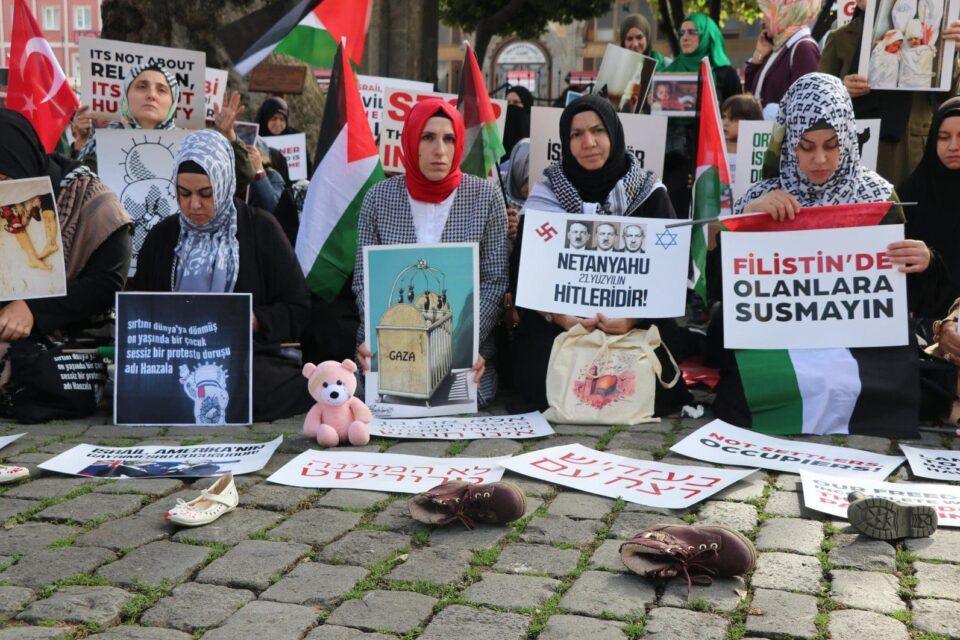‘Great Palestine Rally’ and Sweden’s NATO accession protocol

The Turkish media reported two major developments with the potential to cause a stir in domestic politics. First, Sabah reported that the Justice and Development Party (AK Party) was going to host a pro-Palestinian event, the “Great Gathering for Palestine,” outside its provincial headquarters in Istanbul and that President Recep Tayyip Erdoğan and fellow leaders of the People’s Alliance would attend it. Secondly, the Directorate of Communications announced that President Erdoğan had signed Sweden’s NATO accession protocol and sent it to the Turkish Parliament.
Those two developments suggest that Türkiye will debate where it stands within the international system, what it seeks to achieve, its relations with the West, and its policy toward the Israeli-Palestinian conflict. The Turkish President’s address to the AK Party’s parliamentary caucus on Wednesday, in turn, set the tone concerning Gaza and Sweden.
Sweden’s NATO accession
Whether the Turkish Parliament will immediately deal with Sweden’s accession protocol remains unclear. Notwithstanding, President Erdoğan initiating the parliamentary process represents a new development. Let us recall that Türkiye reiterated its support for NATO’s expansion by approving Finland’s accession protocol last year. This time, the Parliament will review whether Sweden has taken all necessary steps to combat terrorism and make its decision. It is important to recall that President Erdoğan previously stated that the Parliament would have to decide whether or not to accept Swedish membership. How the People’s Alliance and the opposition parties approach Sweden’s application might create a comprehensive framework for negotiations relating to Türkiye’s relations with the West.
The opposition has been divided since the May 2023 elections, and some parties have since expressed interest in contesting next year’s municipal elections alone. Except for the main opposition, the Republican People’s Party (CHP), incomprehensibly opposing the deployment of Turkish troops abroad, the opposition has been largely quiet regarding foreign policy. It is important to note that the Israeli-Palestinian conflict shifted the public’s attention from the military deployment bill. All political parties described Israel’s blockade and bombardment of Gaza as a “massacre” as the Israeli military’s targeting of hospitals, schools, civilian convoys, bakeries, and marketplaces frustrated the Turkish people. The Nationalist Movement Party (MHP) chairperson Devlet Bahçeli’s comments on the situation in Palestine – “Türkiye must promptly step in unless a ceasefire is reached within 24 hours” – shed light on the opinion of various social groups.
Massacres in Gaza
Having urged both sides to exercise restraint in the wake of the Hamas attacks on Oct. 7, Türkiye became more critical due to Israel’s mass punishment in Gaza. President Erdoğan and Foreign Minister Hakan Fidan launched a diplomatic initiative to mobilize the international community and countries in the region for Gaza. As the Israeli military’s bombardment of Gaza’s civilian population assumed the hallmarks of “massacre,” the country began to criticize the United States, which offered its unconditional support to Israel more vocally. At the same time, Turkish officials held bilateral meetings with their regional counterparts at the Organization of Islamic Cooperation (OIC) summit and the Cairo Summit to facilitate a ceasefire, deliver humanitarian aid, and be open to discussion on the two-state solution.
Türkiye has opposed the attempt to relocate Palestinians from Gaza to Egypt or Jordan. Instead, the nation made a constructive proposal by offering to become a “guarantor” for Israel and Palestine. No other country has made an equally positive proposal to date. With the Western government still discussing Israel’s right to self-defense, the Arab states kept their agenda limited. While the Israeli army continues its limited ground operation and heavy bombardment, the Turkish people face a heated debate over the existing world order, the critique of Western values and policies, and Israel within the context of the upcoming pro-Palestinian event and Sweden’s NATO accession protocol.




















